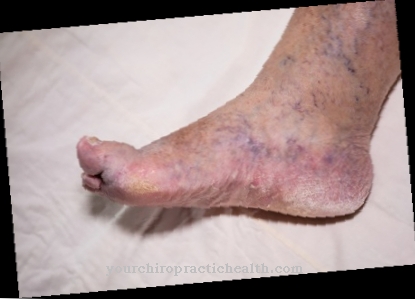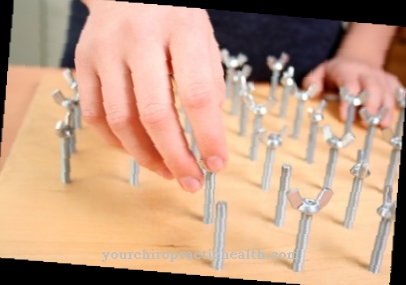Fluctuations in blood pressure in the course of the day are normal and important in order to supply muscles and organs with sufficient blood. Medical clarification is only necessary if the long-term blood pressure shows abnormal values. Because blood pressure that is permanently too low or too high can be a symptom of another disease and poses a health risk for those affected.
What are blood pressure fluctuations?

The blood pressure depends on the age, diet and body weight of the person and is therefore an individually fluctuating value. Nevertheless, there are rough norm values for every age. For example, adult systolic blood pressure should be between 120 and 129 mmHg and diastolic between 80 and 84 mmHg.
Basically, it can be said that these values increase with increasing age without immediately causing concern. Regular self-measurement is still advisable.
Pathological fluctuations in blood pressure are diagnosed as hypertension, the permanently high blood pressure, or hypotension, the permanently low blood pressure. These blood pressure fluctuations are defined on the basis of the systolic value, because the supply of the organs depends on it, while a diastolic blood pressure that is too low is less dangerous. If the systolic value is below 100, hypotension is diagnosed; hypertension is defined from values of 140 to 90 mmHg.
causes
The causes of blood pressure fluctuations can be physical and emotional stress, coffee and caffeine consumption and natural fluctuations in the course of the day.
Blood pressure in the early morning and late afternoon is 10 to 15% higher than at night, depending of course on the individual daily routine. The fluctuations caused in this way are normal and unproblematic, as they normalize quickly.
The triggers for manifest blood pressure fluctuations must be differentiated according to the specific disorder: Hypertension can be hereditary, but it can also be triggered by being overweight, consuming too much salt and stress. The possible causes of hypotension are underlying diseases, such as cardiovascular weaknesses, endocrine disorders, the use of medication or lack of exercise.
Diseases with this symptom
- Obesity
- Heart attack
- Heart disease
- arteriosclerosis
- Heart failure
- anemia
- stroke
- Hypotension
- Mental illness
- Thyroid diseases
- Hyperthyroidism
- high blood pressure
- Pulmonary edema
- Aortic dissection
- Menopause
Diagnosis & course
In particular, members of a risk group should regularly measure their blood pressure and keep a blood pressure diary. If there are persistent abnormalities, a doctor should be consulted.
First of all, the blood pressure is measured. Several blood pressure and pulse measurements while standing and lying down and at different parts of the body enable an accurate assessment of the values. In a detailed anamnesis, the general practitioner will then reflect on the symptoms, find out about eating habits, medication intake and risk factors, and discuss family history and psychological causes.
A long-term measurement over 24 hours may be necessary as well as an exercise ECG and a visit to a cardiologist. The course of blood pressure fluctuations should be viewed critically if timely treatment is not provided. This can lead to organ deficiency, organ damage and even death.
Complications
Fluctuations in blood pressure over the course of the day are perfectly normal; they are even important for ensuring that muscles and organs are adequately supplied with blood. Medical help is only necessary if the blood pressure is permanently too high or too low. Blood pressure is not a constant value; it depends on diet, age and body weight. However, there are rough norm values, for example a blood pressure of 120/80 mmHg should be measured in a healthy adult. With older age these values naturally increase without posing a threat to humans. You can also measure your blood pressure yourself regularly.
Blood pressure fluctuations can also be triggered by physical activity; a lot of caffeine, for example, causes blood pressure to rise. However, emotional stress can also be the cause; fluctuations in blood pressure are directly related to lifestyle. The blood pressure is usually higher during the day than at night, the fluctuations are unproblematic and normalize on their own. Do not seek medical advice until abnormalities appear. High blood pressure can also be hereditary, but most of the time there is simply a lack of proper nutrition or exercise.
High and low blood pressure are treated with tablets and can be brought under control quickly, which of course does not mean that eating habits and risk factors must be maintained. Sometimes a visit to the cardiologist is necessary because the heart can also be affected. A blood pressure disorder must be treated, otherwise organs can be damaged and it can even lead to death.
When should you go to the doctor?
When is a blood pressure fluctuation still within the tolerance range, and when are blood pressure fluctuations a reason to see a doctor? It is important to know that the blood pressure is subject to constant fluctuations resulting from physical and psychological causes. In addition, blood pressure increases somewhat with age. Also known is the increase in blood pressure after consuming coffee, which is felt to be invigorating. The blood pressure measurement is part of the routine check-up when visiting a doctor. Somewhat low or high blood pressure can be due to genetic makeup. However, if blood pressure fluctuations occur over a long period of time, a cause should be sought.
Blood pressure fluctuations up or down indicate a disturbed blood pressure regulation. Possible physical illnesses for a rapid rise in blood pressure are, for example, kidney disease or an incorrect medication setting. If the blood pressure suddenly drops, this is almost always due to a disease in the cardiovascular system and the use of certain medications.
Thyroid dysfunction can also lead to deviations in blood pressure: if the thyroid is overactive, it can lead to a rise in blood pressure; if the thyroid is underactive, it can lead to a drop in blood pressure. It is not uncommon for a temporary drop in blood pressure to occur when switching quickly from lying down to standing. However, fluctuations in blood pressure can also be triggered by impaired self-regulation. Psychological causes are also worth considering.
In addition to the general practitioner, the physician responsible for treating blood pressure fluctuations is also an internist, cardiologist, endocrinologist, neurologist, psychologist or psychotherapist.
Doctors & therapists in your area
Treatment & Therapy
The treatment of blood pressure fluctuations depends on the severity and causes and must also be differentiated between hypertension and hypotension.
A blood pressure that is too low does not have to be treated in every case, as it does not pose a threat to the organism. Regular checks are necessary, however, in order to identify further fluctuations in good time and to counteract them. If the doctor and patient decide on therapy, general measures such as avoiding physical exhaustion, relaxation techniques and a balanced diet are used first. Only when these do not help are drugs used to stimulate the circulation.
The most important goal of high blood pressure therapy is to reduce the resting value as quickly as possible and permanently below 140 to 90. This is always done through drug therapy with beta blockers or diuretics; drugs that have an inhibiting effect on the calcium level or the protein ACE are rarely used. Attempts are also made to minimize existing risk factors by reducing the intake of table salt, aiming for a normal body weight, reducing alcohol consumption and lowering the level of stress.
Outlook & forecast
If your blood pressure fluctuates, you should definitely consult a doctor. It is a serious symptom that must be treated. If treatment is not promptly taken, the worst case scenario is a heart attack and ultimately death.
Slight fluctuations are common during the day. However, if larger fluctuations occur, these must be treated locally. These fluctuations in blood pressure are usually noticeable and lead to symptoms such as dizziness, headaches or a general feeling of illness.
The treatment of blood pressure fluctuations is carried out by the cardiologist. This can often determine the cause, but in most cases it is stress. Relaxation techniques and a healthy diet can help reduce fluctuations here. If the blood pressure is generally too high, it must be reduced in any case. This is mainly done by avoiding alcohol, unhealthy food and unnecessary stress.
If the blood pressure is too low, no therapy is usually given if it does not pose a threat to the body. In most cases, fluctuations in blood pressure can be treated relatively well and therefore do not lead to further complications or difficulties.
prevention
Due to the numerous possible causes of Fluctuations in blood pressure prevention is not always possible. A balanced diet that is not too salty and regular endurance sport are helpful in achieving a reasonable blood pressure level.
You can do that yourself
Fluctuations in blood pressure can be treated by yourself through a number of home remedies and personal measures. First of all, stress and physical exertion should be reduced as much as possible in order to avoid high blood pressure and a subsequent drop in heart rate. In addition, caffeine, alcohol and other luxury foods, but also fatty and heavy foods should be avoided.
Blood pressure can often be stabilized through regular exercise and a generally healthy lifestyle with a balanced diet, adequate sleep and plenty of exercise. Natural fluctuations in blood pressure can be reduced by various stress relief measures such as autogenic training or yoga. Effective home remedies are valerian, mistletoe or garlic. In addition, calming activities such as painting or handicrafts are recommended to lower the stress level and thereby normalize blood pressure. Those affected should, however, first narrow down the possible causes for the fluctuations by keeping a diary and record the effectiveness of the measures mentioned.
Fluctuations in blood pressure that are associated with major symptoms or even negatively affect general well-being must be discussed with the family doctor to clarify the cause. If the cause is known, the fluctuating pulse can usually be tackled quickly and in a targeted manner.













.jpg)

.jpg)
.jpg)











.jpg)